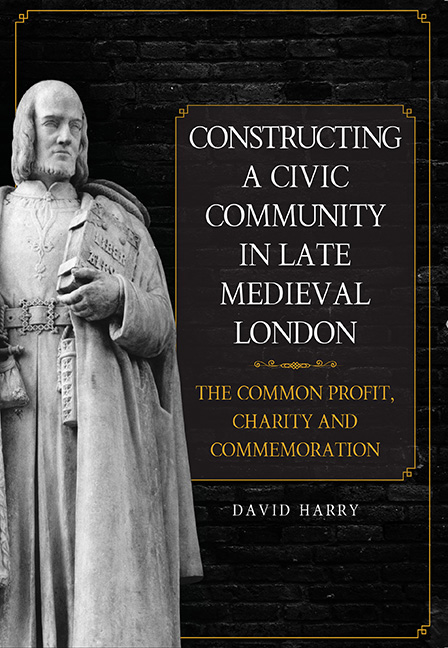Book contents
- Frontmatter
- Dedication
- Contents
- Acknowledgements
- Abbreviations
- Introduction: Common profit and charity in late medieval London
- 1 Radical London, 1376–86
- 2 Reconfiguring political authority
- 3 Civic ceremony and staging the limits of authority
- 4 The exemplary dead
- 5 Spiritual authority and the common profit
- 6 Print and the pursuit of the common profit
- Conclusion
- Bibliography
- Index
- Frontmatter
- Dedication
- Contents
- Acknowledgements
- Abbreviations
- Introduction: Common profit and charity in late medieval London
- 1 Radical London, 1376–86
- 2 Reconfiguring political authority
- 3 Civic ceremony and staging the limits of authority
- 4 The exemplary dead
- 5 Spiritual authority and the common profit
- 6 Print and the pursuit of the common profit
- Conclusion
- Bibliography
- Index
Summary
The central premise of this book, that the governing elite of late medieval London sought to shape political ideology in order to strengthen their legitimacy at a time of social change, has not been untouched by our current political climate. Modern political practice involves competing for control over language – and contemporary theory recognises this. The tools of the political communicator in the twenty-first century include traditional media such as newspapers and television, as well as new media such as the internet and social media. Political messaging, carefully crafted and responsive to market testing and focus groups, can acquire a ‘technical meaning that's really very much divorced from [its] actual meaning, sometimes the opposite of it’. The general perception of political and public comprehension of a political ideology is, in a very real sense, shaped by those who write it. In the context of the late medieval city, although aldermen lacked the ability to communicate so widely, this book has argued that they nevertheless recognised the value of controlling political rhetoric and that they sought to invest their statutes, legal processes, public ritual, civic investment and commemorative practices with a deliberate emphasis that helped determine the meaning of a discourse that benefitted them. This book has argued that the phrase ‘common profit’ could have competing meanings. On one hand, it represented those values integral to a functioning society and beneficial to the many – values such as justice, fair taxation and mutual support. On the other hand, it represented a closed discourse that isolated and protected the few – who benefitted from a body politic that might be willing to overlook their oligarchic tendencies when phrased in the language of community.
Steve Rappaport's study of sixteenth-century London examined the lives and careers of some 530 men granted citizenship in the 1550s. His conclusions suggested that, although life in London could be prosperous for merchants working in the city, and opportunities existed for many to hold offices in the various ‘worlds’ of the city (the ward, the parish, the household, etc.), very few were able to exercise direct participation: ‘that is, their access to political power – was limited since they could be neither wardens nor assistants and also because they had no regular, institutionalised means of influencing the formation of economic and other policies’.
- Type
- Chapter
- Information
- Constructing a Civic Community in Late Medieval LondonThe Common Profit, Charity and Commemoration, pp. 175 - 180Publisher: Boydell & BrewerPrint publication year: 2019



